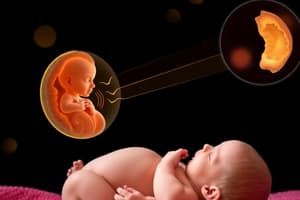Podcast
Questions and Answers
What is the initial response of the foetus to auditory stimulation?
What is the initial response of the foetus to auditory stimulation?
- Laughing
- Crying
- Moving (correct)
- Sleeping
At birth, what sounds do newborns prefer to listen to?
At birth, what sounds do newborns prefer to listen to?
- Music
- People talking (correct)
- White noise
- Animal sounds
What is the frequency range of tones that newborns respond most to?
What is the frequency range of tones that newborns respond most to?
- 50-100Hz
- 500-1000Hz
- 1-3KHz (correct)
- 10-20KHz
What type of sounds will a newborn preferentially suck to hear?
What type of sounds will a newborn preferentially suck to hear?
According to DeCasper & Fifer (1980), what evidence is there that the foetus can learn to recognize the mother's voice?
According to DeCasper & Fifer (1980), what evidence is there that the foetus can learn to recognize the mother's voice?
According to DeCasper and Prescott (1984), what was the preference of newborns for their mother's voice?
According to DeCasper and Prescott (1984), what was the preference of newborns for their mother's voice?
In Eimas et al. (1971), how did 1 and 4 month old infants perceive the speech sounds /ba/ and /pa/?
In Eimas et al. (1971), how did 1 and 4 month old infants perceive the speech sounds /ba/ and /pa/?
What did Eimas et al. (1971) find regarding infants' habituation to the sound /ba/?
What did Eimas et al. (1971) find regarding infants' habituation to the sound /ba/?
What was the result of DeCasper and Prescott's (1984) study on 2-day-olds' preference for their father versus a male stranger?
What was the result of DeCasper and Prescott's (1984) study on 2-day-olds' preference for their father versus a male stranger?
Based on the text, what is the significance of infants' perceptions of speech sounds being categorical?
Based on the text, what is the significance of infants' perceptions of speech sounds being categorical?
What was the outcome of Eimas et al.'s (1971) experiment on infant perception of the sounds /ba/ and /pa/?
What was the outcome of Eimas et al.'s (1971) experiment on infant perception of the sounds /ba/ and /pa/?
Flashcards are hidden until you start studying
Study Notes
Initial Response to Auditory Stimulation
- Fetuses show an ability to respond to auditory stimuli, indicating early auditory processing capabilities.
Newborn Sound Preferences
- Newborns prefer to listen to voices, particularly their mother's voice, indicating an emotional and biological connection.
Frequency Range of Newborns
- Newborns are most responsive to sounds in the frequency range of 250-2000 Hz, aligning with the human voice's key frequencies.
Sucking Responses to Sounds
- Newborns will preferentially suck on pacifiers to hear sounds that they find stimulating or interesting, particularly voices.
Maternal Voice Recognition
- Evidence from DeCasper & Fifer (1980) suggests that fetuses can recognize their mother's voice, showing a predisposition for familiarity.
Mother's Voice Preference
- DeCasper and Prescott (1984) found that newborns displayed a clear preference for their mother’s voice compared to unfamiliar female voices.
Perception of Speech Sounds by Infants
- Eimas et al. (1971) demonstrated that 1- and 4-month-old infants could differentiate between the speech sounds /ba/ and /pa/, indicating early phonetic awareness.
Habituation to Sound /ba/
- Eimas et al. (1971) found that infants habituated quickly to the sound /ba/, signifying that they recognized it as a constant stimulus and reduced their response over time.
Preference for Father vs. Male Stranger
- In studies by DeCasper and Prescott (1984), 2-day-old infants showed a preference for their mother's voice over that of their father and a male stranger.
Significance of Categorical Perception
- Infants’ categorical perception of speech sounds indicates that they can distinguish phonetic categories, which is crucial for language development.
Outcome of Eimas et al.'s Experiment
- Eimas et al. (1971) concluded that infants' ability to discriminate between /ba/ and /pa/ showcases an early understanding of speech patterns, facilitating future language acquisition.
Studying That Suits You
Use AI to generate personalized quizzes and flashcards to suit your learning preferences.




